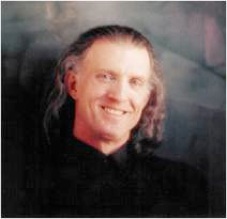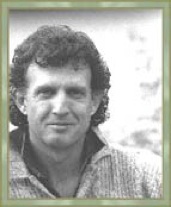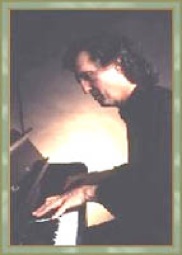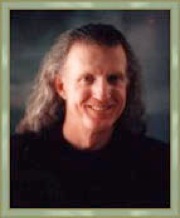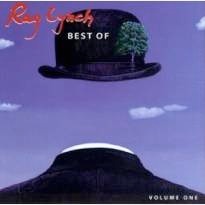Ray Lynch is one of the pioneers of this genre we know and love as "New Age Music". His "Deep Breakfast" is a classic, as is the cut "Celestial Soda Pop" from the same album. Deeply respected as a composer and musician, Lynch often has members of the San Francisco Symphony play on his albums. Ray's career has been long and varied, and made for a wonderful phone conversation earlier this fall.
KP: How did you get started in music?
Lynch: I was originally training to be a solo concert guitarist - that's why I went to Barcelona in the 60's. I started giving concerts when I was 19 or 20, and I got an idea of what that was like, what that life would be, and I didn't like it as much as I thought I would. There were so many elements in it that didn't seem to have much to do with music or at least the parts I was interested in. I didn't like the pressure, I didn't like the memorization, I didn't like doing the same pieces over and over again. I didn't like trying to do a triple flip without falling on my face - I just really didn't see the point. As I was seeing this, I was becoming increasingly more interested in composition, so I went back to the University of Texas to study composition for three or four years. I realized at that time that you can't make a living as a composer - at least not the serious composer I imagined myself to be. I had a choice whether to try to do something with composition or to go back into performing, which I had kept up all along. In the meantime, I had learned to play the lute, which is an antique instrument from the Renaissance. They had one at the University, and I needed to get a credit in ensemble for my degree. I didn't want to play in the band because I didn't play a band instrument, and I didn't want to sing in the choir because I didn't know very much about singing, but I noticed that The Madrigal Singers, which was a small, pretty elite, very well-coached group, happened to have an, old lute. I told them that I would be willing to play for them if they would give me the ensemble credit. That's why I picked up the lute. We were sent almost immediately to Europe by The State Department for a four-month tour. There were twelve voices, and they were delighted to have me because it gave some contrast to their program. I would come out in the first half and accompany a few solo singers doing lute songs; then we might do a couple of Renaissance ensemble pieces; and the rest was basically ensemble singing. In the second half, they would do more modern, contemporary things, and I would play the guitar. It really seemed to help their programming in terms of adding variety. It was also a great experience for me to do a hundred concerts in three months. I'm glad I was about 20 when I did that!
KP: Did the Renaissance Quartet do a lot of touring, too?
Lynch: Yes, but not to that extreme. We played all over the country, but most of it was in New York.
KP: Did either group do any recording?
Lynch: The Renaissance Quartet did a little bit right before I joined them. but there wasn't much of a market. I really don't have any decent recordings of when I was in my prime.
KP: How old were you when you wrote your first song?
Lynch: I wrote my first guitar piece when I was eighteen or nineteen, and I was writing pretty regularly when I was studying composition in my early twenties. I really didn't start writing music in the sense that you know it until I was in my late 30's. That's despite the fact that I had heard that in order to compose you have to start young and do it every day, which, fortunately, I didn't believe. When I first went to college, I studied psychology and philosophy and some of the other areas I was interested in, but I soon realized that my interest in those areas could be satisfied simply by reading books.
KP: You were exploring various philosophies and spiritual teachings?
Lynch: I was exploring different religions - I was a truth seeker of the armchair variety - but it's always been a real interest of mine. The other option I had was mathematics, which was what I was best at.
KP: That seems to be true of a lot of musicians.
Lynch: There is definitely a connection in the level of abstraction that it takes to really understand both. After trying these other things, I came to the conclusion that music was really what I loved and wanted to do, and I would just have to take the consequences. Fortunately for me, it worked out well enough all along so that I was never actually threatened, so to speak, by the choice that I made.
KP: You never had any starving periods?
Lynch: Not exactly, no.
KP: Did you have other jobs while you were getting the music going?
Lynch: When I was younger, I was a performer - I stuck with it. Then I went back to college, and after that, I went straight to New York. On a lark, I had gone to an early music seminar down in Mexico given by some New York musicians. I took my lute and played for some of these people, accompanying them, doing lute songs, ensemble playing, and so forth. They were impressed enough to ask me to come to New York to replace the lutanist who had had to resign from their company. This was right at the time when I was ending the college tour and was trying to decide what to do with my life. That's what showed up, so I jumped for it and was with them for about seven years. I lived in Manhattan for two years, and that was all I could take. For the rest of those years, several of my colleagues and I had a farm in Maine. We were all musicians we all had families, and we bought property in Maine and farmed it (in a gentlemanly sort of way). Periodically, we'd go to the city to do a round of concerts, and we did a summer music school. People would come and stay with us and study for a month. And we did a lot of farming. When I came to California 24 years ago, I did some ordinary jobs for awhile because it was just not possible to make a living in music on the west coast. I did some session work - more guitar than lute, but some lute also. I did that for awhile, but it really wasn't enough to keep me going, so I was a handyman - I helped paint houses, did carpentry, and used some of the skills I learned on the farm. Then for about five years, I was an industrial purchasing agent for various companies in the Bay Area. It was good for me to do ordinary work and to learn that there was no problem with that. I had led a pretty unusual life up to that point so it was good to see that I could support myself no matter what. I did that until I realized that if I didn't do music, I was really going to waste my life. That's when I went back into music, and specifically, into composition.
KP: That was in the later 70's?
Lynch: Yes. I had done ordinary jobs long enough to see what it was that I really wanted and needed to do, but there had also been a technological revolution in the music industry itself that gave me the tools to compose in the way I wanted to compose. I didn't want to do only guitar pieces or piano pieces or small chamber works - I also wanted to do larger works. In college, I had studied orchestra, and wrote some orchestral pieces. I liked that, but I didn't have an orchestra! There were some things happening that sort of opened some doors. There was a marketing channel called New Age Music, which I didn't understand at the time.
KP: No one does! Still!
Lynch: Even less now! But at least it was an alternative marketing concept that didn't involve contracts and huge record companies that don't know what you are all about. It was something I could do at a grass roots level. There was also the technology for creating records and tapes that was suddenly affordable. Multi-track recording machines before that time were $20-50,000 on up, which was out of the question. Even synthesizers were too expensive and not flexible enough. And they were huge. You'd spend $20k for a room full of gear that would do one monophonic line. It was interesting but not practical. By the mid-late 70's, synthesizers were getting to be polyphonic, they were becoming less expensive, there were multi-track recording machines - you could get a 4-track cassette recorder, which was a revelation from my point of view. Then there were 8 tracks and suddenly 16 tracks that were quite affordable, and that's what I did "Deep Breakfast" on. It was a fairly inexpensive 16-track 1/2" machine. So I had the technical means, and I also had a market, so I went for it.
KP: Have you been with Windham Hill all along?
Lynch: I have only been with Windham Hill for three or four years. Initially, I was independent - it was just Ray Lynch Productions. I did both "The Sky of Mind" and "Deep Breakfast" independently. At a certain point, "Deep Breakfast" was selling a lot, and the orders were getting larger and more difficult to handle out of my house. That's when I made an agreement with MusicWest. In fact, that company was formed based on an agreement with me. I worked with MusicWest for three or four years. Then that relationship came to an end and I was independent again for a time. Eventually I signed a contract with Windham Hill.
KP: Have the ownership changes at WH affected you much as an artist?
Lynch: It affects everybody, and it's not just WH. It's the music business as a whole. They've all gotten leaner and meaner. There was an era that WH enjoyed that was different from what's going on now. It's hard for an artist these days to deal with the market. It's changed in terms of its priorities, and what it accepts, rejects and expects. That's also in response to how the world has changed and how the listening public has changed. I see some pretty amazing changes from the time when I was growing up.
KP: Everything seems to be big business-oriented rather than artist-oriented.
Lynch: It's really sort of a game, unfortunately. I've noticed that Americans do not seem to listen to music very much in a serious way. There's plenty of music around, and it's often on, and it's used in various ways, but when was the last time you sat down with a group of friends and stayed absolutely silent for an hour or two while you listened to a great piece of music? It doesn't happen very often, but it used to happen all the time.
KP: Many of the artists I've talked to expect their music to be used for relaxation or in the background, but you want your listeners to take an active part.
Lynch: Let me put it this way. If people are going to evaluate the music, they have expose themselves to it. I have no objection to my music being used in all kinds of ways, but if I really want to know what music is all about, I'll sit down and listen to it very carefully on a good system with high volume, and nobody talks - no interruptions. So many people don't understand that. They'll start listening to a piece of music often on a system that can't even reproduce it properly and want to make comments while it's still going on. Would you go to a museum and look at a VanGogh with a flashlight? It's exactly the same thing. You can't evaluate it on that basis because you can't even see it.
KP: Since the guitar was your primary instrument in your teens, did you continue to play the piano as well, or did you pick that up again later?
Lynch: I took piano lessons as a youngster, but I didn't continue to play. I never dropped the piano completely because I always used it as a composing tool. It's easier for me to compose on piano, rather than guitar - unless it's a guitar piece or directly related in that way. I was never a pianist in the sense that I had technique, could sight-read music easily, or could play a lot of pieces. I stopped doing that when I was about eleven, and I never went back to the piano on that basis. The keyboard skills that I do have are simply through having to play certain things in order to make a recording. I will simply practice a line that needs to be recorded until I can play it properly. Then I'll play it properly, and I'll probably never play it again. The advantage of working with sequencers on computers is that if you make a mistake, you can correct it. I manipulate a lot of the performances that way. The point for me is not the performance - it's the end result on the recording. I'm not making a performance, and I'm not writing a piece of music that needs to be performed - I'm creating a recording, and I want it to be as impeccable as I can make it. Any trick you use in the studio is completely okay.
KP: Did you stop performing because the music you were writing was too difficult to do live?
Lynch: No. I stopped performing because I was more interested in making the recordings. Creating music for performance and creating music for recording are not the same, and I found that creating music for recording was so difficult that it took up all my time. I didn't really have time to consider whether I could perform it or not, and since I was creating specifically for that medium, I wasn't taking the performance problems into account. In order to perform much of my music, the music would have to be re-cast - relearned so it could be performed. Some of it can be performed and has been, but it's not always an easy process. There's not always a direct translation, you know? When you're in the studio, you're creating music, or at least I am, somewhat like a painter. You have a canvas, and you put down something and you look at it. Then you add, and erase, and work it. You work it until it's right. Some of the pieces on " The Sky of Mind" had been performed in various contexts before I made the record. I was just doing performing at that time because I wasn't thinking of myself as a composer. I don't think I've ever performed anything from "Deep Breakfast". There are some pieces on there that are chamber pieces and could be performed. It wouldn't sound exactly like what's on the record, but it would certainly be recognizable. It could be done, but I was never particularly interested because I was always working on the next album. I'm pretty slow as a producer of music, and I'm something of a perfectionist. I also have the luxury of time, so I take it.
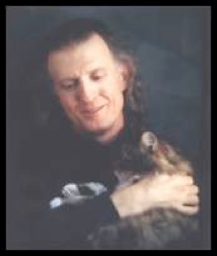
KP: You really hadn't done much composing before you came to California to study with Adi Da Samraj? He encouraged you to start?
Lynch: Yes, on a couple of levels. Since this was a new tradition, we didn't have any music to rely on. Adi Da was interested in using devotional chanting because he recognized the power of it when he was studying in India. I was the only real musician in the group at that time, which was fairly small, and it became clear that that was something I should do. I started developing some fairly simple responsive chants, often using the guitar as an accompaniment. I did that for a number of years. That was very challenging. You'd think something as simple as a chant would be fairly easy to write but it was quite the contrary. The simpler it needed to be, the harder it was. You have to develop a sensitivity for learning how to do that properly. Simplicity was the greatest challenge. At a certain point, Adi Da said, "Ray, you should be writing music." He wasn't referring to just the chants or anything; he was referring to what I was really impulsed to do and wasn't doing at the time. He just dropped that remark, and it never came up again. Not too long after that, I started feeling that I really would be wasting my life if I didn't do what I loved, and I just felt like I had to do it and take the consequences. I assumed that would be the poverty and insecurity that most musicians have to put up with. It wasn't that I was feeling particularly ambitious, I just knew deep down that I had to do this. I was also seeing that it was somehow possible - that I could at least eat and pay the rent. So, I quit my job. The music that I've created commercially is not directly related to the music I did for the devotional culture that I was involved in, with the exception of some of the pieces on "The Sky of Mind". That album is sort of infused with the feeling of the devotional culture, and some of the music on there had been used by the community in various ways. I had also produced a cassette of devotional music before I did any commercial music, and I saw in that process that I could make a record. It's a struggle, but it can be done. Then you sell it to people and, hopefully, get your money back. My first time out, I certainly didn't make any money, but I didn't lose any. I wasn't doing it for the money anyway, but I could see in the process that it was possible, and that I enjoyed working in the studio
KP: How did you market "The Sky of Mind"?
Lynch: Actually, I stumbled across an independent wholesaler who took tapes from various composers and sold them to outlets around the Bay Area. I happened to run into him in a metaphysical bookstore in San Francisco, and saw him thumbing through some tapes while I was looking at books. He was going down the row, and instead of taking tapes out, he was putting tapes in, so I asked him what he was doing. He said he was an independent music distributor, and he placed music in these stores; then he waited to see how it sold. I asked him if I made a tape would he sell it, and he said he'd have to listen to it first. So I made it and sent it to him, and he ordered 25. I paid to have the tapes reproduced and sent them off to him. After a couple of months, he ordered some more, and then more. It was slow, but it was steady.
KP: So they were mostly getting placed into bookstores?
Lynch: Yes, and alternative "mom and pop" kinds of stores. The great thing about that time was that the stores played the music all day long, and if they found something they liked, they played it a lot. That's one of the reasons "Deep Breakfast" sold so well - it was being played in a lot of stores, so people were exposed to it. That's a problem with getting your music placed in a place like MusicLand. You might be able to get it in there on the shelf, but who knows it's there? They're going to play rock and roll, not new age. It's not going to sell unless unless people come in wanting it specifically. In the early part of the alternative markets, a lot of my music was played on a regular basis, so people heard it.
KP: Much of your recorded music seems to be either really joyful or more melancholy. Are you a person with wide mood swings, or are these moods and feelings you especially enjoy conveying in music?
Lynch: I'm not a manic depressive or anything, but I have loved music with both of those aspects, and the melancholy has always been an important part of music for me. I expressed a lot of that without thinking about it in "The Sky of Mind". "Deep Breakfast" had a different quality. There was some melancholy in there, but it didn't predominate - it was more upbeat. Part of that was just my own enthusiasm for being able to work the way I was working. I could see that I would be able to continue doing it. Also, there was new technology available like the Yamaha DX-7 synthesizer. I had sounds that worked that were different from what I had worked with before. I could do different things, and was pushed into a new direction.
KP: The two new cuts on the "Best of" album seem very upbeat. Is the rest of the album going to be like that?
Lynch: The new one? If and when it's ever finished? It's hard to say - probably. I was moving in that direction.
KP: How far along are you with it?
Lynch: Well, I'm interrupted right now, actually. My feeling is that the world is entering a real crisis right now, and I'm dealing with that in all kinds of ways. I'm doing finances and preparation and learning about what's going on. I think the world is about to change in some major ways, and I see that most people are very unprepared for it. We're having a global financial meltdown right now, which I think is going to plunge the world into at least a recession and probably a depression by next year. I also think the computer problems that are going to start surfacing next year are a lot more serious than most people realize. The Y2K problem threatens to bring our infrastructure to its knees at least for a time. People can acknowledge that, but they aren't looking at what that could mean. It's going to be deadly if it goes on for very long, and it certainly has the potential. I can't predict the future, but I've been looking at the evidence for the past five or six months, and it's hard to not be a pessimist when you see the evidence. So, I'm preparing for that, as a lot of people are. There's just a lot of really serious stuff going on in the world right now, and it's created a situation where it is almost impossible for me to work with any real attention. Music is certainly what my life is going to be about, and I'm going to get back to it, but in the meantime, it seems to me we're in an emergency. There is a whole range of opinion about it from brown outs for a couple of weeks to the collapse of civilization. The downside potential is very great especially considering the level of denial and the lack of understanding about it. Writing music at this point does not seem to be the most rational thing to do, unfortunately. So the album is on hold for now. It will happen again, but I'll have to feel like there is a reason to make it. If the infrastructure is threatened and you don't have any electricity, being an electronic musician isn't the best career choice! That's the level at which we're dealing. Things are moving now, and I don't think they're stoppable. Of course, what we do between now and then will have a great deal to do with how things turn out. It doesn't all have to be viewed negatively. I can see some really positive things that could come out of it, actually. If the breakdown is severe enough, it would give human beings time to build a more human arrangement for society.The music business isn't exactly on my radar screen right now, although I hope it will be again once I can see how all of this is going to turn out. I don't claim to be a prophet or a doomsayer or anything, and I'm not convinced that what I see is correct. I've been wondering about the future for fifty years, and I've never once been right! It's hard for me to take myself that seriously, but I do think it's a serious problem, and I have taken a serious look at it. I'd rather have a plan without an emergency rather than an emergency without a plan. On the other hand, if we go without electricity for awhile, there could be a big comeback in live acoustic music!
KP: When you are writing music, how do you go about it?
Lynch: I don't have one way of composing. I collect musical ideas - I might be improvising, or thinking of something, or I might have a particular form in mind - and I'll just make a note of it. I'll either write it out or record something, and collect these things. At some point, I'll get an idea for a piece, and I might use some of these elements. Or I might develop a piece from one particular idea. Sometimes great things happen when you make a mistake or accidentally put two things together that you didn't intend to. Most recently, "The Music of What Happens", was a piece that happened in a different way. That's how it got its title - it wasn't planned. I sort of let that piece happen. I had written everything except the violin parts, and had the form down pretty much the way it is.
I was about ready to start adding some more lines to fill the piece out, and a violinist friend happened to be in town. I invited him over - not because I wanted him to play on this piece, but because I wanted to see how he worked in the studio. I had this piece on my sequencer, and had him start improvising. He started throwing stuff down, and I was recording it on my hard drive. We spent about an hour. He didn't even listen to the piece before he started playing - we did that for six or seven takes. He was about to leave, and I said, "Let's do it one more time, and this time it's not possible to make any mistakes." I could see he was really good at improvising, and I wanted him to feel he could do anything he wanted to without ruining anything. That was the take I wound up using the most of. Even after I was finished, I wasn't planning on using it, but I started listening to his takes. Sometimes I'd have two or three of them up on the board at the same time, something I really hadn't intended to do, but then I realized that it was having a very interesting effect. It changed the character of the piece almost entirely - especially when I combined his improvisations in various ways. I got the idea that it was going to work, and I started to like what was happening. Then I started editing what he had done - moving things around, taking things out, dubbing some things here and there. At the end of the process, I said "that's the music of what happens."
KP: It sounds so seamless; I'm really surprised to hear that the improvisations were manipulated.
Lynch: He played it very well - it's not like I had to make up for that. A lot of the decisions had to do with how much to put in there. That piece sort of pushes the envelope in terms of comprehensibility, if you really listen to it. There's so much going on that if you try to follow it all, it takes you right to the edge. And that was the point. It's supposed to take you right to the edge of, well in the positive sense, ecstasy. When I finished the song, I realized that the piece was about coming as close as you can to dropping into chaos without losing it . I really wanted to try that! So, that's a different way of working for me - usually I'm very much in control, but I think you have to allow things to happen. It's not that I'm the originator here - I'm the instrument that allows something to be made, but I'm not the source of what's great about the music. You have to be willing to be used, and to let the music happen. I did control it in a lot of ways - I'm responsible for it in that way. I'm responsible for the shortcomings, but I'm not responsible for the energy and vision altogether. That's not something that I claim.
KP: You see yourself as an instrument.
Lynch: Yes, sometimes a good one, and sometimes a bad one. Sometimes I can do it or allow it, and sometimes I can't. That's part of the struggle of being creative with anything. It's finding a place where we can work where we allow enough and are in control enough that it makes sense. It's kind of like a translator - you don't necessarily have to understand what's going on. A lot of times when I'm working with music, I'll connect up two things accidentally. It will suddenly make sense, but it's not that I saw it beforehand - but I could see it when it happened. That's a sensitivity I think an artist needs - to at least recognize it when it is good - and also when it isn't good or it's not working.
KP: What's your ultimate goal as a composer/musician?
Lynch: I don't have a goal as a composer, really, other than to make each piece as good as I can make it. I demand that it be successful as a piece of music or I won't release it. If it's a commercial success, then that's good.If it isn't, it's still a good piece of music. That isn't given too much credibility in today's world. There's nothing wrong with good musicians being rewarded, and I think more musicians should be successful at various levels. But that in itself is not the point. If you are really an artist, you are doing it because you love it so much you can't not do it. What you do care about is that be as beautiful and as well done as it can possibly be. That's why you kill yourself to get it right. Then you have to let go of it, and you can enjoy it. If it brings something back, then that's good. If it doesn't, at least you've done what you're supposed to do.
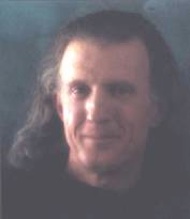
I can make it. I demand that it be successful as a piece of music or I won't release it. If it's a commercial success, then that's good.If it isn't, it's still a good piece of music. That isn't given too much credibility in today's world. There's nothing wrong with good musicians being rewarded, and I think more musicians should be successful at various levels. But that in itself is not the point. If you are really an artist, you are doing it because you love it so much you can't not do it. What you do care about is that be as beautiful and as well done as it can possibly be. That's why you kill yourself to get it right. Then you have to let go of it, and you can enjoy it. If it brings something back, then that's good. If it doesn't, at least you've done what you're supposed to do.
KP: I really understood what you wrote in the liner notes of "Best of" when WH wanted to you to re-do "Celestial Soda Pop". You did get it right the first time!
Lynch: Yes, but on the other hand, I thought it would be fun to do something entirely different, and just see what that was. I learned a lot in the process of doing that.
KP: So you didn't have much input on what they did?
Lynch: I just let them do their thing, and then I took it and made what I could out of it. I learned about disco, and I actually had a lot more respect for them afterwards than I did before. I could see a lot of what they did and why they had done it. It took me awhile to learn how to listen to it, because it was such an assault! After I came to terms with it, I simply made it into something that was possible for me to listen to and to enjoy.
KP: Are you going to use the extended version on an album?
Lynch: I don't think so. There was some talk about releasing it, but the market is so dicey and weird that I don't see too much point in it. I've been surprised at how much positive response I've had to it. One woman said, "it's got the lower body in it, but it still has that feeling that the upper body and the heart, and some of the subtleties are there." In a way, it was attempting a lot, and what it achieved is not immediately recognizable. For me, it did something very interesting. I like listening to it, except for being bludgeoned to death! You don't concentrate on the pounding beat, and you can't expect great subtlety, and yet the elements are there - it's more than just a dance piece. It does have its own subtleties that are hard to hear. After listening to it a hundred times, I began noticing a lot of things I hadn't heard before - I hadn't been able to focus on them.
KP: Would you explain the concept of "headless" music?
Lynch: It's kind of hard to explain. I'm trying to get headless here! "Nothing Above My Shoulders But the Evening" implies that, essentially, the mind can get in the way of your perception. It can also assist - it's not like it's necessarily an enemy or anything, but in order to listen to a piece of music really properly, I think you need to drop into the audial world that that piece represents, assuming that you're listening to it with a full spectrum of sound. You need to let go of the mind and thought at a certain level, and even the sense of your separate existence to whatever degree that might be possible for you in that moment. It's not even necessarily something you do deliberately, but is something that the work, if it's properly perceived, will allow. You can fall into a perceptual space that's ordinarily not allowed by the kinds of survival mechanisms that we all have to deal with every day. There shouldn't be anything going on except the music. It shouldn't be analyzed. It shouldn't be looked at from outside. I guess the key word is "participation". If you're going to understand art, you have to participate. That's a responsibility, a commitment, and a capacity to allow it to be the universe. Once you do that, you will perceive it differently. It will mean more than you imagined it could. Not that you could describe it, necessarily.
KP: No, but it would be a much bigger experience than passively listening to something and not paying much attention.
Lynch: Right. There is also a matter of allowing the emotional being to respond, which can be blocked by our mentality. If the head is not the primary focus, then the heart can be exercised.
Kathy Parsons
January 1998

